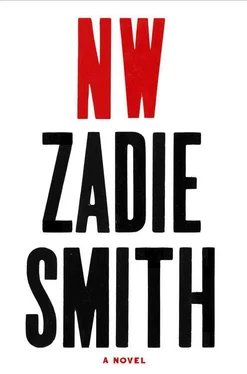13. Gravel
Walking back from school with a girl called Anita, Keisha Blake and Leah Hanwell found themselves being told a terrible story. Anita’s mother had been raped by a cousin in 1976 and this man was Anita’s father. He had been put in jail and then got out and Anita had never met him and did not want to. Some of the family thought her father had raped her mother and some did not. It was a domestic drama but also a kind of thrilling horror because who could say if Anita’s rapist father wasn’t living in NW itself and/or watching them from some vantage point at this very moment? The three girls stopped in the gravel courtyard of a church and sat on a bench. Anita cried, and Leah cried too. Anita asked: “How do I know which half of me is evil?” But parental legacy meant little to Keisha Blake; it was her solid sense that she was in no way the creation of her parents and as a result could not seriously believe that anybody else was the creation of theirs. Indeed, a non-existent father and/or mother was a persistent fantasy of hers, and the children’s books she had most enjoyed always began with the protagonist inheriting a terrible freedom after some form of parental apocalypse. She made a figure of eight on the ground with her left trainer and considered the two pages she had to write about the 1804 corn laws before tomorrow morning.
14. That obscure object of desire
The red and white air technology of the Greek goddess of victory. Keisha Blake put her hand against the reinforced shop-front glass. Separated from happiness. It had been everywhere, the air, free for the taking, but she had only come to desire it now that she saw it thus defined, extracted, rendered visible. The infinitely available thing, now enclosed in the sole of a shoe! You had to admire the audacity. Ninety-nine quid. Maybe at Christmas.
15. Evian
The exact same thing had been achieved with water. When Marcia Blake spotted the bottle hiding under a bag of carrots she cussed Keisha Blake, snatched it out of the trolley and placed it back on the wrong shelf next to the jams.
16. The new timetable
“There: he’s in your French class. And your drama class.”
“Who is?”
“Nathan!”
“Bogle? So?”
“!”
“Oh my gosh, Keisha. We were babies . You’re so dumb sometimes.”
17. GCSE
In the office of Keisha Blake’s Head of Year baseball caps and inappropriate jewelry were confiscated and hung from the wall on hooks. Keisha Blake had not been called in for a reprimand, she had come to discuss her options for a set of exams still three years in the future. She did not really want to discuss these exams, she simply wanted it to be noted that she was the kind of person who thought three years ahead about the important things in life. As she got up to leave she spotted a silver chain from which drooped a tiny pistol picked out in diamante crystals. “That’s my sister’s,” she said. “Oh, is it?” said the teacher and looked out of the window. Keisha persisted: “She doesn’t go here anymore. She got expelled.” The teacher frowned. He took the necklace from the wall and passed it to Keisha. He said: “It’s hard to believe that you and Cheryl Blake are even related.”
18. Sony Walkman (borrowed)
That Keisha should be able to hear the Rebel MC in her ears and at the same time walk down Willesden Lane, was a kind of miracle and modern ecstasy, and yet there was very little space in the day for anything like ecstasy or abandon or even simple laziness, for whatever you did in life you would have to do it twice as well as they did it “just to break even,” a troubling belief held simultaneously by Keisha Blake’s mother and her Uncle Jeffrey, known to be “gifted” but also “beyond the pale.”
19. Detour into the perfect past tense
(Sometimes Jeffrey — who was not a member of the church — cornered his thirteen-year-old niece and told her perplexing things. “Look it up! Look it up!” he had said, yesterday, at Cousin Gale’s wedding. Keisha could only presume he was referring to a prior conversation, that had taken place many weeks earlier. Therefore he had meant: “Look up the CIA’s practice of flooding poor black neighbourhoods with crack cocaine and you will see that I am right.” How? Where?)
20. Sony Walkman redux
That two such different personalities as her mother and Uncle Jeffrey should hold an opinion simultaneously lent that opinion some force. Yet surely none of you would begrudge Keisha Blake this present pleasure of thinking to music? Oh, this outdoor soundtrack! Oh, this orchestral existence!
21. Jane Eyre
When being bullied Keisha Blake found it useful to remember that if you read the relevant literature or watched the pertinent movies you soon found that being bullied was practically a sign of a superior personality, and the greater the intensity of the bullying the more likely it was to be avenged at the other end of life, when qualities of the kind Keisha Blake possessed — cleverness, will-to-power — became “their own reward,” and that this remained true even if the people in the literature and the movies looked nothing like you, came from a different socio-economic and historical universe, and — had they ever met you — would very likely have enslaved you or, at best, bullied you to precisely the same extent as Lorna Mackenzie who had a problem with the way you acted like you were better than everyone else.
22. Citation
Further confirmation of this principle was to be found in the Bible itself.
23. Spectrum 128k
For her fourteenth birthday Leah received a home computer. Keisha Blake read through the accompanying booklet and was able to figure out how to program a basic series of commands so that in answer to particular prompts text would come up on the screen as if the computer itself were “talking.” They did one for Mr. Hanwell:
>> gt;>> gt;WHAT IS YOUR NAME
“I’m to type it in here? I feel silly.”
>> gt;>> gt;COLIN ALBERT HANWELL
>> gt;>> gt;VERY NICE TO MEET YOU, COLIN.
“My word! Did you do that, Keisha? How do you do these things? I can’t keep up with you these days. Pauline, come and look at this, you won’t believe it.”
After they had finished dazzling the Hanwells, they did one for their private amusement:
>> gt;>> gt;WHAT IS YOUR NAME?
>> gt;>> gt;LEAH HANWELL
>> gt;>> gt;OH REALLY? THAT’S JUST FUCKING FASCINATING.
24. The number 37
On Sundays, Keisha Blake attended Kilburn Pentecostal with her family, minus Cheryl, and Leah often came along, not because she was in any sense a believer, but rather motivated by the generosity of spirit described above. Now a new policy revealed itself. When they reached the corner by the McDonald’s Leah Hanwell said to Keisha Blake, “Actually I think I might get on the 37, go to the Lock, see that lot.” “Fair enough,” said Keisha Blake. There had been an attempt over the summer to mix that Camden Lock lot with this Caldwell lot, but Keisha Blake did not especially care for Baudelaire or Bukowski or Nick Drake or Sonic Youth or Joy Division or boys who looked like girls or vice versa or Anne Rice or William Burroughs or Kafka’s Metamorphosis or CND or Glastonbury or the Situationists or Breathless or Samuel Beckett or Andy Warhol or a million other Camden things, and when Keisha brought a wondrous Monie Love 7-inch to play on Leah’s hi-fi there was something awful in the way Leah blushed and conceded it was probably OK to dance to. They had only Prince left, and he was wearing thin.
Читать дальше











